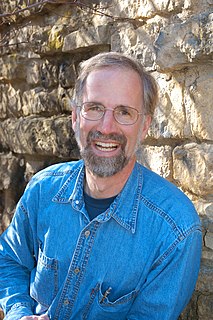A Quote by Karen Armstrong
And sometimes it's the very otherness of a stranger, someone who doesn't belong to our ethnic or ideological or religious group, an otherness that can repel us initially, but which can jerk us out of our habitual selfishness, and give us intonations of that sacred otherness, which is God.
Related Quotes
Eroticism is first and foremost a thirst for otherness. And the supernatural is the supreme otherness. This is perhaps the most noble aim of poetry, to attach ourselves to the world around us, to turn desire into love, to embrace, finally what always evades us, what is beyond, but what is always there – the unspoken, the spirit, the soul.
I stood willingly and gladly in the characters of everything - other people, trees, clouds. And this is what I learned, that the world's otherness is antidote to confusion - that standing within this otherness - the beauty and the mystery of the world, out in the fields or deep inside books - can re-dignify the worst-stung heart.
By seeing the otherness in that which is most unfamiliar, we can learn to see it too in that which at first seemed merely ordinary. If wilderness can do this - if it can help us perceive and respect a nature we had forgotten to recognize as natural - then it will become part of the solution to our environmental dilemmas rather than part of the problem.
Fear is so fundamental to the human condition that all the great spiritual traditions originate in an effort to overcome its effects on our lives. With different words, they all proclaim the same core message: "Be not afraid." Though the traditions vary widely in the ways they propose to take us beyond fear, all hold out the same hope: we can escape fear's paralysis and enter a state of grace where encounters with otherness will not threaten us but will enrich our work and our lives.
We are separated from one another by an unbridgeable gulf of otherness and strangeness which resists all our attempts to overcome it by means of natural association or emotional or spiritual union. There is no way from one person to another. However loving and sympathetic we try to be, however sound our psychology however frank and open our behaviour we cannot penetrate the incognito of the other man, for there are no direct relationships, not even between soul and soul. Christ stands between us, and we can only get into touch with our neighbors through Him.
Give us, O Lord, a steadfast heart, which no unworthy affection may drag downwards; give us an unconquered heart, which no tribulation can wear out; give us an upright heart, which no unworthy purpose may tempt aside. Bestow upon us also, O Lord our God, understanding to know you, diligence to seek you, wisdom to find you, and a faithfulness that may finally embrace you; through Jesus Christ our Lord.
Although our moral conscience is a part of our consciousness, we do not feel ourselves on an equality with it. In this voice which makes itself heard only to give us orders and establish prohibitions, we cannot recognize our own voices; the very tone in which it speaks to us warns us that it expresses something within us that is not of ourselves.
There seems to be something poetically that doesn't work or is limiting when you call God 'God' in a poem. When I tried to be honest with myself in my relationship with God, Christ is, on the one hand, completely dark, he's transcendent and unknown. On the other hand, he is completely imminent and completely knowable as Jesus. Our tradition speaks of him in both ways as transcendent but also as a lover who comes to us, and the two word 'Dark One' seem to me to contain both things, the transcendence and otherness of Christ, but also like a kind of dark lover who comes to us.
When I talk about the God who is with us, for us, and ahead of us, I'm talking about our facing that which most terrifies us about ourselves, embracing it and fearing it no longer, refusing to allow it to exist separate from the rest of our being, resting assured that we are loved and we belong and we are going to be just fine.
What has the Cross left in each of us? You see, it gives us a treasure that no one else can give: the certainty of the faithful love which God has for us. A love so great that it enters into our sin and forgives it, enters into our suffering and gives us the strength to bear it. It is a love which enters into death to conquer it and save us.






































